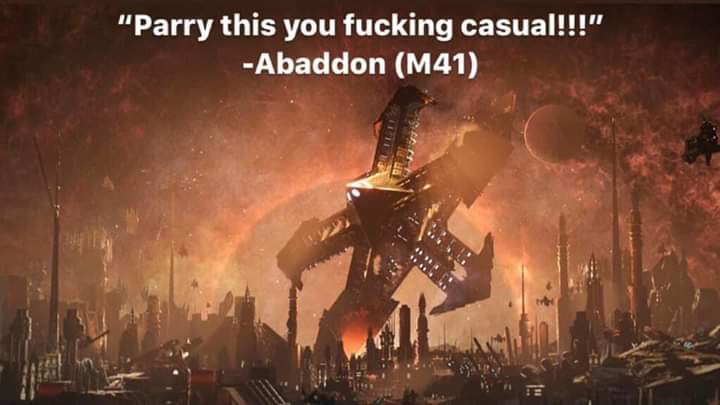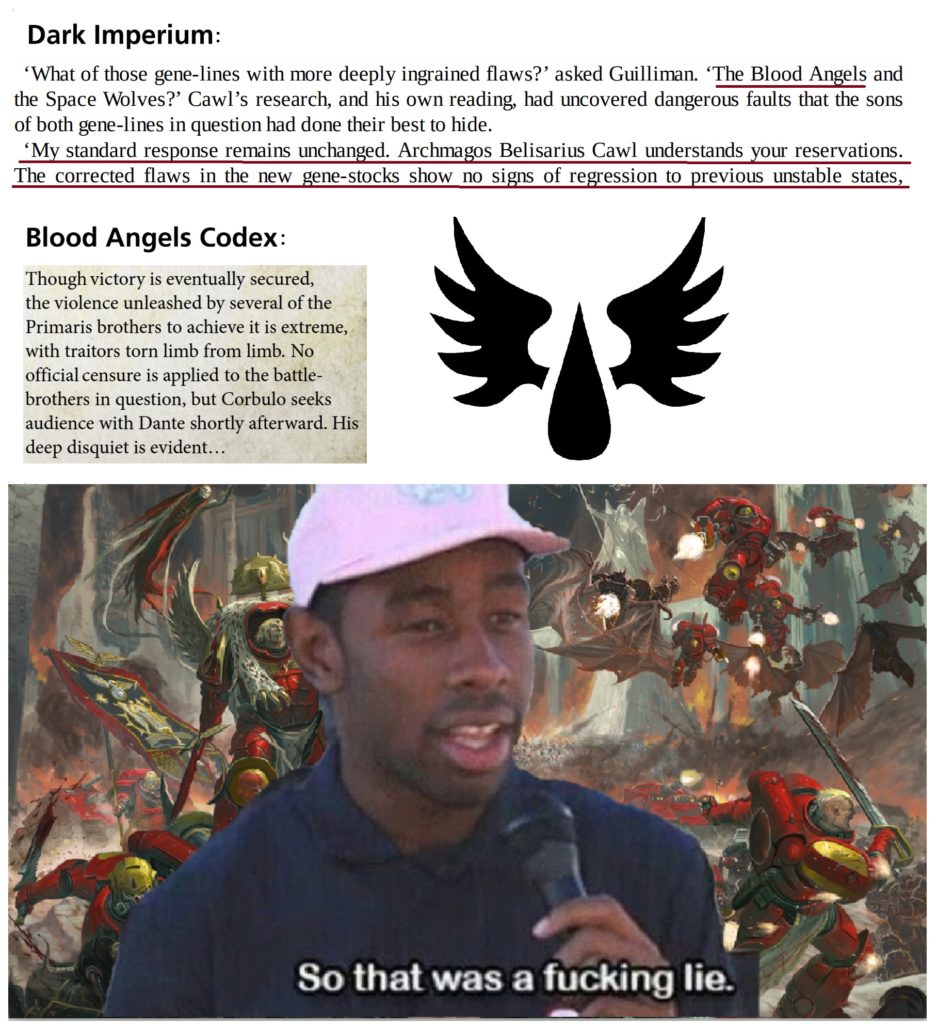If you listened to our voxcast about The Devastation of Baal, then you already know Jen and I had a bunch of questions as to how this person did this thing, what was going on during this other thing, and why this one thing was mentioned and dropped. A few kind listeners/viewers on YouTube kindly filled in the blanks for us. Other than the fact we totally blanked on Mephiston being trapped, all of the answers to our questions reside in the Codices from Games Workshop. If we had read the Codex regarding the tyranid attack on Baal, we’d know how Guilliman got to the other side of the Great Rift. If we had read the Vigilus Defiant
Codex before reading Spear of the Emperor, we would have known why Calgar was the first vanilla Space Marine to receive the Primaris treatment.
As someone who does not read the Codices, this frustrates the hell out of me. Why isn’t the complete story in the novel? If there’s not going to be a book about what happened to Marneus Calgar and why he needed to become a Primaris Marine, why not provide some background when someone mentions oh btw, Calgar is a Primaris now. Because of my affection for the character, I purchased the Codex to get the full skinny on it.
Holy Throne, this stuff is NOT cheap.
The Codices Are Pricey, yo
Jen and I both, admittedly, spend too much money on book club books, because we’re always snagging the limited editions or hardbacks. Part of that is so we can be timely with the book club, and another part is that we like pretty, shiny things. When 2-3 of these new shiny books release a month, it adds up quickly. This doesn’t even count the books we buy to fill our background knowledge.
The Codices don’t release as often, but they are twice as expensive (or even four times, compared to paperback prices) as a new novel. I cried a bit inside when I bought Vigilus Defiant. It’s why I haven’t bought any additional Codices, despite how much I hear they fill in the novel gaps.

There is also a great possibility and therefore risk that a Codex won’t fill in any new information for the novels. That’s an expensive gamble to make, especially if it doesn’t pan out. I’m not saying that the Codices should guarantee new lore not found in the books every time, because the Codices serve a completely different function than the novels. I am saying that it’s a risky investment for someone who does not play the tabletop game.
And How Is This Any Different From Those Video Game Novels You Read?
Okay, first of all, that’s fair. I can’t imagine reading Gears of War: Aspho Fields without the first Gears of War game under your belt. In many ways, this is similar to knowing the Codices. In order to play the tabletop game Warhammer 40,000, you have to know the rules and background story. Looking at it this way, the video games are the Codices, and the video games are pricier than the Codices to be sure.
That said, however, there aren’t as many video games for each extended lore universe as there are Codices. There are currently 26 Codices and rule books listed on Games Workshop’s website, not counting the supplements (which are $30 each, by the way). In the case of Gears of War, there are six video games. I don’t have to do the math to see which is cheaper.
Are all of these video games crucial for understanding the overall lore for Gears of War? Absolutely not. I could easily argue against Gears of War Judgment, but that’s still one game out of six. The risk here is relatively low.
Why Can’t They Get Along?
I’ve seen the argument that those who read the Codices don’t want that lore reiterated in the books, because they already know it. They want to learn something new by reading the novels. I 100% understand that, but can’t we find some sort of compromise here?

In the case of the novel Cadia Stands, I had no idea that the planet broke (yes, before the guard did) because Abaddon hurled a Blackstone Fortress at it. I had no idea that Saint Celestine was even there, despite the fact it makes perfect sense that she would be. I know (now) that the Codices contained all of this information. The book is fine as it was, but was there no way to mention these things? I finished the book under the assumption that Cadia broke because the Black Legion was stealing the planet’s warding pylons. Maybe mention the Saint’s presence? Just something to round out the full story without going into those full details. At this point, I’d appreciate a footnote explaining where one can find the rest of the story. That’s one thing I’ll give comic books with all of their insane reboots and crossovers.
Not to mention, can we PLEASE have Games Workshop and Black Library WORK TOGETHER when it comes to defining lore? It’s not cool to read in post-rift novels that the Primaris Blood Angels don’t experience the Black Rage, only for the Codex to release and say no they totes do. I get it that the Codices are canon and the Black Library is fluff, but some conversation between the two to stay on the same page would be just lovely.



Like it or not, the meta-narrative of 40k is pushed not by BL authors writing novels, but by Studio authors writing codexes and campaigns. This is because anything that directly supports or showcases the miniatures are always going to be seen as the primary audience, with Black Library just there to add nuance/fix plotholes. It sucks for those of us that are only in it for the lore and not the models or the game. If there’s anything us fellow readers can do to make this easier, please let us know.
“Not to mention, can we PLEASE have Games Workshop and Black Library WORK TOGETHER when it comes to defining lore?”
Gonna hone in on this part because it’s something that has quite a bit of history to it. From ~2013 to 2015 Black Library used to be in the same office, under the same management as Games Workshop Studio, under the combined title of Publishing. It was a disaster for everyone involved. We thought it would mean there’d be closer cooperation between codex writers and BL novelists in terms of plot and characterization. Instead, it just forced BL authors to work according to the hectic studio release schedule, pushed to showcase only whatever new model or codex was out that week and leaving no time to work projects that didn’t focus on the models. Some authors were affected more than others, but from the collection of comments about this period, BL became completely subservient to the whims of the Studio. It was an era of, at best, average quality releases for 40k and endless short stories and limited edition novellas for 30k (take a look at how many HH anthologies were released in 2016. Mostly clean up from this earlier era). It almost led to (we think) Abnett and McNeil leaving BL entirely.
Now the two are separate again, allowing authors a lot more freedom in regard to the topics they cover. The downside is for material that does directly tie into the meta-narrative, BL authors are often given an unfinished version of the “core” material, meaning details are likely to be changed or added after the novel is already in the works.
Hope that helps clear some things up.
I totally agree with what you said. The fact of the matter is the novels support the game not the other way around.
Then the novels should support it. Help the readers out by POINTING them to the specific codices.
Like Jared said the novels are made to support the game and not the other way around. Unless GW had BL go back and tell the 40K stroy from day one like the HH then it’s impossible to put all the meta-narrative into the novels.
I get that, but would it be so hard to put a footnote in books? Please see xxx codex. Comics do it all the time. I don’t see why the BL can’t in order to fully support GW.
Funny thing is, some of the older novels did have footnotes. Not proper citations to other sources, but definitions of unique titles or uncommon equipment.
Part of the issue with proper citations is many times the author doesn’t know what codex is going to have that information. They might be given the details of the meta-narrative in various notes and outlines that the public will never see, but the studio will pull that apart and piece it together across the codex range to match the appropriate factions. Or pull out a piece and make it the plot for a box set.
There’s also no designated “lore editor” to make sure that things match across different series or sources. Within a series, authors have someone to make sure things stay consistent, but there’s usually nothing requiring an author portray factions or events the same, other than a sense of not wanting to step on someone’s toes.
There used to be a lore editor for the Horus Heresy, Laurie Goulding, but I believe he only got involved around book 14 (The First Heretic) and now no longer works for BL.
Then they need to hire me. I’ll be the emeffing lore editor.